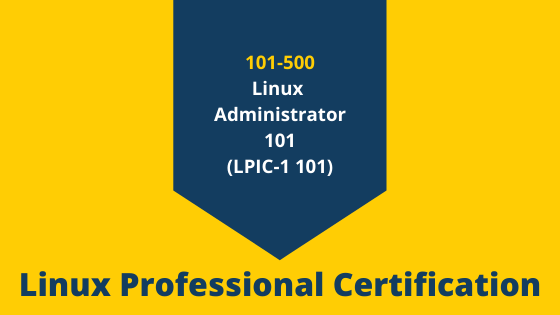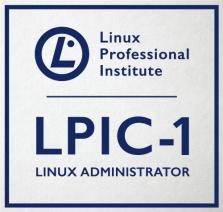Linux has currently been gaining global recognition. Used in almost all the devices that we use in our day-to-day lives. Modeled on UNIX, Linux enables your system hardware and software to communicate with each other. Linux OS powers android, it is one of the most reliable Operating Systems. Furthermore, it is free and easy to install and distributed under an open-source license. Linux versions are called distributions, and listed as:
1. Mint
2. Debian
3. Ubuntu
4. openSUSE
5. Manjaro
6. Fedora
7. Elementary
8. Zorin
9. CentOS
10. Arch
Best Linux Certifications
If you have a Linux certification, you always have excellent career opportunities. Organizations are more interested in hiring resources who are capable of managing servers, schedule batches, cron jobs, apply load balances, and work entirely on shell script. Certifications keep you ahead of the crowd and increase your competitive advantage.
Once certified in Linux, you have the following career opportunities:
1. Systems Administrator/ System Engineer
2. Software Programmer
3. Linux Administrator/ Linux Engineer
4. DevOps Engineer
5. Python Developer
6. Network Engineer
Here we have listed the best Linux certifications for you to boost your career.
1. GCUX – GIAC Certified Unix Security Administrator
This certification hardens the candidate’s knowledge of Linux/Unix systems, Linux/Unix Digital Forensics, and Linux Application Security. This certification renders a candidate with the necessary abilities to secure Linux and Unix systems, handle security issues with multiple tools such as SSH, AIDE, and more. Cybersecurity enthusiasts can also pursue this certification. This certification intendsSecurity professionals & Administrators, Auditors, Incident Responders, Technical Experts of the UNIX/Linux Systems, and Information Security Analysts. This certification needs to be renewed every 4 years to ensure ongoing competency in the field of Information Security.
2. Linux+ CompTIA

This certification covers the latest foundational skills and is a job-focused Linux Certification. It covers tasks performed in Linux distributions, Linux Command line, maintenance, installation, configuration, and networking. It provides hands-on experience in configuring, supporting, and monitoring servers that run the Linux Operating System. It focuses on security, storage, and visualization, kernel modules, enterprise-level device management, git & automation, server-side and command line, networking, and firewalls, troubleshooting, and SELinux.
3. LPI (Linux Professional Institute)
It is a multi-level Linux Professional Certification Program. It has the following levels.

This certification enables a candidate to perform command-line maintenance tasks, install and configure a Linux system, and its basic networking. It validates a candidate’s ability to manage a real-world system administration. This certification does not require any prerequisites. The validity of this certification is 5 years. A candidate is required to pass both 101 and 102 exams to qualify for the certification. The main topics covered by this certification are:
1. System Architecture
2. Linux Installation
3. Package Management
4. GNU and Unix Commands
5. Linux Filesystems, Filesystem Hierarchy Standard and Devices
6. Shell & Shell Scripting
7. Desktops and Interfaces.
8. Administration
9. System Services
10. Fundamentals of Networking
11. Security

It is the second of LPI’s multilevel professional certification. It enables the candidate to administer small to medium-sized networks. To qualify for this certification, the candidate needs to have an active LPIC -1 Certification. However, the LPIC-1 and LPIC-2 exams can be taken in any order. The validity of this certification is 5 years. This certification covers the following topics:
1. System StartUp
2. Linux Kernel
3. FileSystem and Devices
4. Capacity Planning
5. Advanced Storage Device Administration
6. Network Configuration & System Maintenance
7. File Sharing and Network Client Management
8. Domain Name Server
9. Web and Email
10. System Security

Mixed Environment: also named as LPIC – 3 300. It provides for an enterprise-level professional certification program that represents the highest level of proficiency in distribution-neural Linux. It requires a candidate to have an active LPIC – 2 certification. The validity of this certification is 5 years. It covers the following areas of interest:
1. OpenLDAP Configuration and Authentication Backend
2. Samba – Basics, Share Basics, User & Group Management
3. Samba – Name Services and Domain Integration
4. Working with Windows and Linux Clients.
Apart from LPIC – 3 300, there are two more specialization certifications at this level. Passing any one of the three grants the certification for that specialty. Its prerequisites and validity periods are the same as that for LPIC 3. The other two certifications are:

As the name suggests, the certification emphasis the security of the enterprise-wide Linux administration. Its areas of coverage span across Cryptography, Access Control, Operations Security, Applications Security, and Network Security.
This certification focuses on virtualization and high availability of the enterprise-wide Linux administration. It covers Virtualization and High Availability of Cluster Management and Cluster Storage.
4. LFCS (Linux Foundation Certified System Administrator)

This certification is ideal for beginners in Linux System Administration. It evaluates candidates based on on-the-job task simulations and real-world scenarios. It equates to hands-on experience for prospective employers. This certification is conducted online and has a validity of 3 years. This certification needs no prior knowledge of the subject matter. Its prime areas of focus are:
1. Essential Commands, File Systems, and Features.
2. User and Group Management and System-wide environments
3. Operation of Running Systems, Boot, Reboot, Install, Configure, and Troubleshoot.
4. Service Configuration, DNS, SSH, HTTP and Virtual Machine Maintenance.
5. Networking, IP Routing, and synchronization
6. Storage Management, LVM Storage, RAID Devices, and configure File Systems.
5. LFCE (Linux Foundation Certified Engineer)

This certification is for candidates with 3-5 years of Linux experience. It enables candidates to develop higher levels of expertise for more advanced job roles. It is a performance-based examination and focuses more on on-the-job scenarios. However, there are no prerequisites for this certification. This certification is valid for 3 years. The core domains of this certification are:
1. Essential Commands, File Systems, and Features.
2. User and Group Management and System-wide environments
3. Operation of Running Systems, Boot, Reboot, Install, Configure, and Troubleshoot.
4. Service Configuration, DNS, SSH, HTTP and Virtual Machine Maintenance.
5. Networking, IP Routing, and synchronization
6. Storage Management, LVM Storage, RAID Devices, and configure File Systems.
6. Oracle Linux Administration Certification Paths
This certification path provides you with the necessary to the advanced foundation for the Oracle Linux Operating System. It is the only Linux distribution, optimized for Linux Operating System, which also includes Oracle Database Appliance, Oracle Exalogic Elastic Cloud, Oracle Exadata Database Machine, and Oracle Exalytics In-Memory Machine. They differ in their subject matters. We have listed them as per the certification below.
6.1. Oracle Certified Associate (OCA) | Oracle Linux 5 and 6 System Administrator

This certification covers the following areas of expertise:
1. Linux Essentials
2. Installing Oracle Linux
3. Understanding System Configuration Options
4. Managing Ksplice
5. Managing System Logging
6. Managing Users and Groups
7. Managing Storage Devices
8. Managing File Sharing
9. Managing Pluggable Authentication Modules
10. Monitoring and Troubleshooting Oracle Linux
11. Describing Oracle Linux Concepts
12. Understanding and Configuring the Linux Boot Process and Service Administration
13. Installing and Maintaining Packages
14. Automating Tasks
15. Managing Kernel Modules
16. Managing Filesystems and Swap on Oracle Linux
17. Managing the Network Configuration
18. Using Open SSH
19. Managing Linux Security
20. Managing Oracle on Oracle.
6.2. Oracle Certified Professional (OCP) | Oracle Linux 6 System Administrator

The main areas of focus in this certification are:
1. Btrfs Filesystem
2. Linux Containers (LXC)
3. Oracle Cluster File System 2
4. Core Dump Analysis
5. Managing Storage
6. Configuring and maintaining BIND
7. Virtualization with Linux
8. Control Groups
9. Advanced Storage Administration
10. Advanced Software Package Management
11. Dynamic Tracing with Dtrace
12. Configuring Networks and Network Services
13. Managing SELinux
14. XFS Filesystem
15. Managing Web and Email Services
6.3. Oracle Certified Specialist (OCS) | Oracle Linux 6 Certified Implementation Specialist

This certification is for those with a strong foundation in the implementation of Oracle Linux solutions. An up-to-date and proven work experience is required to pursue this training. This certification is more focused on members of the Oracle Partner Network who, on its completion, would be recognized as OPN Certified Specialists. This certification covers the following topics:
1. Introduction to Oracle Linux
2. Linux Boot Process
3. Oracle Linux Package Management
4. Automate Tasks and System Logging
5. Oracle Linux File Systems and Storage Administration
6. Basic Security Administration
7. Installing Oracle Linux 6
8. Oracle Linux System Configuration and Process Management
9. Ksplice Zero Downtime Updates
10. User and Group Administration
11. Network Administration
12. Oracle Linux System Monitoring and Troubleshooting
Red Hat provides a whole lot of certifications, segregated as per expertise and specialization level. The certifications need to be qualified in a particular order.
7. Red Hat Level
Out of the many, we have listed 3 main certifications to begin your journey. The rest of the certifications depend on your area of expertise and work experience.
7.1. RHCSA (Red Hat Certified System Administrator)

This certification enables you to perform the core system administration tasks in Red Hat Linux Environments. An RHCSA certification enables you to:
1. Handle files and directories, command-line environments, and documentation.
2. Operate running systems, identify processes, run Virtual Machines and Control Services
3. Storage Configuration
4. File System Configuration
5. Manage Core Services
6. Manage Users and Groups.
7. Manage Security and SELinux Configuration
7.2. RHCE (Red Hat Certified Engineer)
A candidate needs to be a qualified RHCSA to earn this certification. An RHCE can automate Red Hat Enterprise Linux tasks, integrate and automate emerging Red Hat technologies. The new RHCE certification, based on Linux 8, focuses on Linux System Administration Task Automation using Ansible and Shell Scripting. This certification needs renewal every 3 years.
7.3. RHCA (Red Hat Certified Architect)
This program can adapt to a variety of requirements. It refers to RHCE, RHCEMD (Red Hat Certified Enterprise Microservices Developer), or RHCJD (Red Hat Certified JBoss Developer). Two RHCA certifications can be acquired. They are RHCA – Infrastructure and RHCA – Enterprise Applications. Candidates can choose to follow any or both of the learning paths.


































